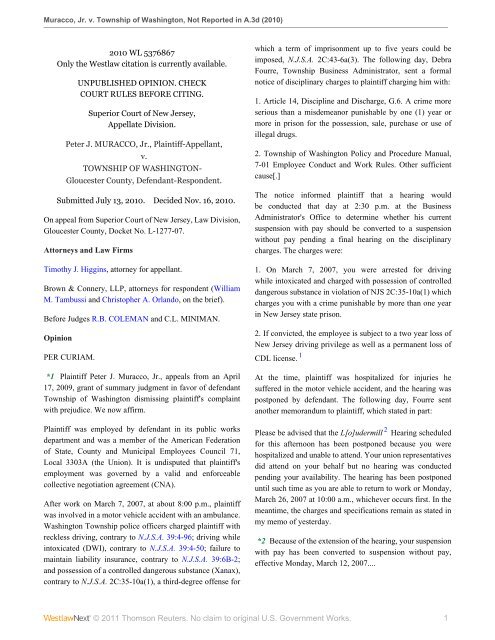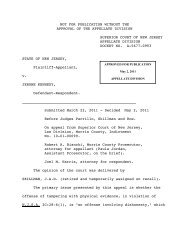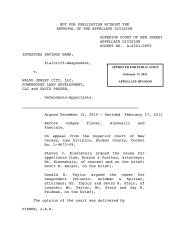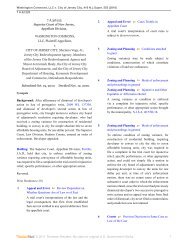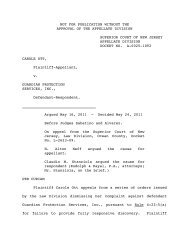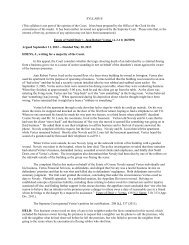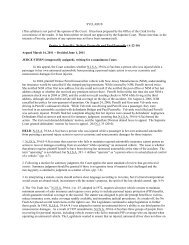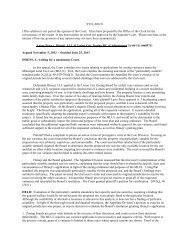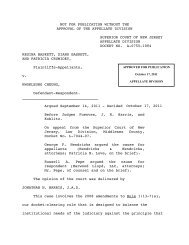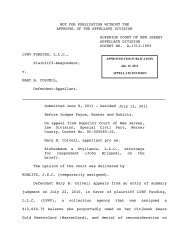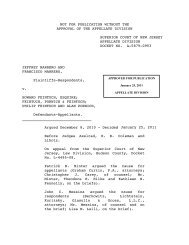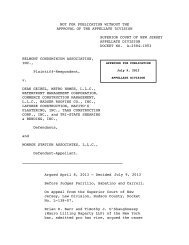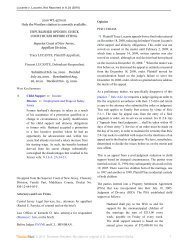Muracco v. Township of Washington - Appellate Law NJ Blog
Muracco v. Township of Washington - Appellate Law NJ Blog
Muracco v. Township of Washington - Appellate Law NJ Blog
Create successful ePaper yourself
Turn your PDF publications into a flip-book with our unique Google optimized e-Paper software.
<strong>Muracco</strong>, Jr. v. <strong>Township</strong> <strong>of</strong> <strong>Washington</strong>, Not Reported in A.3d (2010)<br />
2010 WL 5376867<br />
Only the Westlaw citation is currently available.<br />
UNPUBLISHED OPINION. CHECK<br />
COURT RULES BEFORE CITING.<br />
Superior Court <strong>of</strong> New Jersey,<br />
<strong>Appellate</strong> Division.<br />
Peter J. MURACCO, Jr., Plaintiff-Appellant,<br />
v.<br />
TOWNSHIP OF WASHINGTON-<br />
Gloucester County, Defendant-Respondent.<br />
Submitted July 13, 2010. Decided Nov. 16, 2010.<br />
On appeal from Superior Court <strong>of</strong> New Jersey, <strong>Law</strong> Division,<br />
Gloucester County, Docket No. L-1277-07.<br />
Attorneys and <strong>Law</strong> Firms<br />
Timothy J. Higgins, attorney for appellant.<br />
Brown & Connery, LLP, attorneys for respondent (William<br />
M. Tambussi and Christopher A. Orlando, on the brief).<br />
Before Judges R.B. COLEMAN and C.L. MINIMAN.<br />
Opinion<br />
PER CURIAM.<br />
*1 Plaintiff Peter J. <strong>Muracco</strong>, Jr., appeals from an April<br />
17, 2009, grant <strong>of</strong> summary judgment in favor <strong>of</strong> defendant<br />
<strong>Township</strong> <strong>of</strong> <strong>Washington</strong> dismissing plaintiff's complaint<br />
with prejudice. We now affirm.<br />
Plaintiff was employed by defendant in its public works<br />
department and was a member <strong>of</strong> the American Federation<br />
<strong>of</strong> State, County and Municipal Employees Council 71,<br />
Local 3303A (the Union). It is undisputed that plaintiff's<br />
employment was governed by a valid and enforceable<br />
collective negotiation agreement (CNA).<br />
After work on March 7, 2007, at about 8:00 p.m., plaintiff<br />
was involved in a motor vehicle accident with an ambulance.<br />
<strong>Washington</strong> <strong>Township</strong> police <strong>of</strong>ficers charged plaintiff with<br />
reckless driving, contrary to N.J.S.A. 39:4-96; driving while<br />
intoxicated (DWI), contrary to N.J.S.A. 39:4-50; failure to<br />
maintain liability insurance, contrary to N.J.S.A. 39:6B-2;<br />
and possession <strong>of</strong> a controlled dangerous substance (Xanax),<br />
contrary to N.J.S.A. 2C:35-10a(1), a third-degree <strong>of</strong>fense for<br />
which a term <strong>of</strong> imprisonment up to five years could be<br />
imposed, N.J.S.A. 2C:43-6a(3). The following day, Debra<br />
Fourre, <strong>Township</strong> Business Administrator, sent a formal<br />
notice <strong>of</strong> disciplinary charges to plaintiff charging him with:<br />
1. Article 14, Discipline and Discharge, G.6. A crime more<br />
serious than a misdemeanor punishable by one (1) year or<br />
more in prison for the possession, sale, purchase or use <strong>of</strong><br />
illegal drugs.<br />
2. <strong>Township</strong> <strong>of</strong> <strong>Washington</strong> Policy and Procedure Manual,<br />
7-01 Employee Conduct and Work Rules. Other sufficient<br />
cause[.]<br />
The notice informed plaintiff that a hearing would<br />
be conducted that day at 2:30 p.m. at the Business<br />
Administrator's Office to determine whether his current<br />
suspension with pay should be converted to a suspension<br />
without pay pending a final hearing on the disciplinary<br />
charges. The charges were:<br />
1. On March 7, 2007, you were arrested for driving<br />
while intoxicated and charged with possession <strong>of</strong> controlled<br />
dangerous substance in violation <strong>of</strong> <strong>NJ</strong>S 2C:35-10a(1) which<br />
charges you with a crime punishable by more than one year<br />
in New Jersey state prison.<br />
2. If convicted, the employee is subject to a two year loss <strong>of</strong><br />
New Jersey driving privilege as well as a permanent loss <strong>of</strong><br />
CDL license. 1<br />
At the time, plaintiff was hospitalized for injuries he<br />
suffered in the motor vehicle accident, and the hearing was<br />
postponed by defendant. The following day, Fourre sent<br />
another memorandum to plaintiff, which stated in part:<br />
Please be advised that the L[o]udermill 2 Hearing scheduled<br />
for this afternoon has been postponed because you were<br />
hospitalized and unable to attend. Your union representatives<br />
did attend on your behalf but no hearing was conducted<br />
pending your availability. The hearing has been postponed<br />
until such time as you are able to return to work or Monday,<br />
March 26, 2007 at 10:00 a.m., whichever occurs first. In the<br />
meantime, the charges and specifications remain as stated in<br />
my memo <strong>of</strong> yesterday.<br />
*2 Because <strong>of</strong> the extension <strong>of</strong> the hearing, your suspension<br />
with pay has been converted to suspension without pay,<br />
effective Monday, March 12, 2007....<br />
© 2011 Thomson Reuters. No claim to original U.S. Government Works. 1
<strong>Muracco</strong>, Jr. v. <strong>Township</strong> <strong>of</strong> <strong>Washington</strong>, Not Reported in A.3d (2010)<br />
When you are cleared to return to work by your doctor, you<br />
will need to provide my <strong>of</strong>fice with written documentation <strong>of</strong><br />
the clearance.<br />
On March 22, 2007, plaintiff's attorney sought an<br />
adjournment <strong>of</strong> the hearing pending his receipt <strong>of</strong> discovery<br />
and any and all documents to be used by defendant at<br />
the hearing. He also suggested that it would be premature<br />
to conduct a hearing while the criminal charges were still<br />
pending with the Gloucester County Prosecutor's Office. The<br />
hearing was not rescheduled by defendant.<br />
On June 13, 2007, plaintiff sought and was granted a<br />
conditional discharge for a term <strong>of</strong> one year in connection<br />
with a disorderly persons <strong>of</strong>fense under N.J.S.A. 2C:35-10c.<br />
Plaintiff also pled guilty to the DWI charge and had his<br />
driver's license suspended for two years. Various fines and<br />
penalties were imposed in connection with both <strong>of</strong>fenses,<br />
and the charges under N.J.S.A. 39:4-96 and 39:6B-2 were<br />
dismissed.<br />
On August 6, 2007, plaintiff filed a Verified Complaint<br />
instituting this action. He alleged the facts we have outlined<br />
above and noted that he was required to use all <strong>of</strong> his accrued<br />
vacation time and personal days during the suspension. He<br />
alleged that the charge remanded by the prosecutor to the<br />
municipal court, a violation <strong>of</strong> N.J.S.A. 2C:35-10c, was a<br />
disorderly persons <strong>of</strong>fense subject to no more than six months<br />
in jail. Plaintiff contended that he had been constructively<br />
discharged and that defendant had prematurely suspended<br />
him without pay and without a proper hearing. He also alleged<br />
that defendant's conduct had deprived him <strong>of</strong> due process by<br />
its refusal to reschedule a hearing.<br />
On October 4, 2007, defendant's counsel wrote to plaintiff's<br />
counsel confirming the adjournment <strong>of</strong> the hearing until<br />
October 11, 2007, and requested his consent to a Stipulation<br />
to Extend Time to Answer the complaint.<br />
On October 11, 2007, defendant conducted a “Public<br />
Hearing in the Peter <strong>Muracco</strong>, Jr. vs. <strong>Washington</strong> <strong>Township</strong><br />
matter.” Both parties' counsel attended the hearing, and<br />
the hearing <strong>of</strong>ficer, Jack Lipsett, Business Administrator,<br />
reserved decision. On October 15, 2007, defendant answered<br />
the complaint and asserted various affirmative defenses,<br />
including failure to exhaust administrative remedies.<br />
Defendant did not assert that plaintiff was required to arbitrate<br />
the dispute. On October 18, 2007, Lipsett released his<br />
decision in which he ruled in favor <strong>of</strong> defendant for several<br />
reasons:<br />
The <strong>Township</strong> <strong>of</strong> <strong>Washington</strong>'s Policy and Procedures<br />
Manual clearly states in section 5-08 that any employee<br />
whose work requires the operation <strong>of</strong> <strong>Washington</strong> <strong>Township</strong><br />
vehicles must hold a valid Driver's License.<br />
Additionally, the township job description for Laborer states<br />
that one <strong>of</strong> the requirements is to possess a Class B CDL<br />
driver's license.<br />
Furthermore, [plaintiff] was in receipt <strong>of</strong> the directive from<br />
2000 that all Municipal Service Department employees must<br />
have a CDL license.<br />
*3 It is an essential job requirement for a Laborer working<br />
for <strong>Washington</strong> <strong>Township</strong> to have a license to do his job<br />
effectively. Mr. <strong>Muracco</strong> will not have a license for the<br />
foreseeable future.<br />
Accordingly, he should be terminated from employment<br />
effective immediately.<br />
On February 24, 2009, defendant, for the second time, moved<br />
for summary judgment, asserting in its statement <strong>of</strong> material<br />
facts that a CNA applied to plaintiff's employment and that<br />
Article 14(B) gave defendant the right to suspend or discharge<br />
an employee “immediately prior to an appeal or grievance<br />
hearing where it is determined by the township personnel that<br />
the employee is unfit for duty or is a hazard to any person<br />
if permitted to remain on the job.” Additionally, defendant<br />
alleged that the CNA in Articles 13 and 14 “sets forth the<br />
procedure in which an employee can challenge disciplinary<br />
decision[s] up to and including termination.”<br />
The Statement asserted the facts <strong>of</strong> defendant's accident<br />
and arrest and the nature <strong>of</strong> the charges. It set forth the<br />
facts <strong>of</strong> defendant's disciplinary action and the hearing<br />
scheduled and then postponed at plaintiff's request. It<br />
stated its decision to suspend without pay effective March<br />
12, 2007, and acknowledged plaintiff's counsel's letter <strong>of</strong><br />
representation and request to adjourn the March 26, 2007,<br />
hearing and suspend all disciplinary action pending action by<br />
the Gloucester County Prosecutor's Office, which defendant<br />
granted. Defendant then described the outcome <strong>of</strong> the<br />
criminal charges, plaintiff's plea to DWI and a violation <strong>of</strong><br />
N.J.S.A. 2C:35-10c, and the sentences imposed.<br />
The Statement also asserted that plaintiff's disciplinary<br />
hearing was scheduled for October 4, 2007, and adjourned<br />
at plaintiff's request. When it was conducted on October 11,<br />
2007, the <strong>Township</strong> Business Administrator, Jack Lipsett,<br />
© 2011 Thomson Reuters. No claim to original U.S. Government Works. 2
<strong>Muracco</strong>, Jr. v. <strong>Township</strong> <strong>of</strong> <strong>Washington</strong>, Not Reported in A.3d (2010)<br />
served as the hearing <strong>of</strong>ficer in accordance with the CNA.<br />
On October 18, 2007, Lipsett ruled in favor <strong>of</strong> defendant<br />
and formally terminated plaintiff's employment. Finally, the<br />
Statement asserted that pursuant to Article 13 <strong>of</strong> the CNA,<br />
plaintiff had thirty working days to request arbitration to<br />
challenge the decision but failed to do so, which barred further<br />
challenge to the decision to terminate.<br />
Defendant argued that it was entitled to summary judgment<br />
because the court lacked jurisdiction over the dispute by<br />
virtue <strong>of</strong> Articles 13 and 14 <strong>of</strong> the CNA because the parties<br />
had agreed to arbitrate disciplinary disputes. Even if that<br />
were not so, defendant argued that the only issue properly<br />
before the court was whether defendant had the authority to<br />
suspend plaintiff without pay before a Loudermill hearing was<br />
conducted.<br />
In plaintiff's responding Statement <strong>of</strong> Material Facts, he<br />
denied that the CNA could waive the requirements <strong>of</strong><br />
Loudermill for a hearing prior to suspension without pay<br />
and that he never waived these rights at any time after his<br />
arrest. He stated that he had been constructively terminated on<br />
March 8, 2007, in contravention <strong>of</strong> his rights and that Lipsett's<br />
action was not done pursuant to the terms and conditions <strong>of</strong><br />
the CNA. Further, the notice <strong>of</strong> termination made no reference<br />
to any rights <strong>of</strong> appeal.<br />
*4 Plaintiff filed a cross-motion for summary judgment,<br />
which he supported with his own certification, and in his<br />
Statement <strong>of</strong> Material Facts explained that he requested an<br />
adjournment <strong>of</strong> the hearing because he expected that the<br />
criminal charge would be downgraded to a disorderly persons<br />
<strong>of</strong>fense, which would not be a ground for termination <strong>of</strong> his<br />
employment. He stated that he had been granted a conditional<br />
discharge in the <strong>Washington</strong> <strong>Township</strong> Municipal Court,<br />
came under the supervision <strong>of</strong> probation, and successfully<br />
completed the program. He further stated that when he was<br />
hired in 1998, “there was no requirement that a laborer have<br />
a New Jersey driver's or CDL license” and that no such<br />
requirement had been incorporated into the Employee Manual<br />
or Policy and Procedures Manual nor imposed by resolution<br />
<strong>of</strong> the governing body. He asserted that there was very little<br />
driving involved in his duties as a laborer and that janitorial<br />
positions did not require driving at all.<br />
Plaintiff argued that defendant failed to comply with Rule<br />
1:6-6 because the supporting certification to defendant's<br />
summary judgment motion was signed by defendant's<br />
counsel, not an employee or elected <strong>of</strong>ficial <strong>of</strong> defendant.<br />
He also argued under Loudermill that he was entitled to<br />
reinstatement, full back pay, and benefits due to defendant's<br />
failure to provide due process, notice, and opportunity<br />
to be heard prior to discipline and termination. Last, he<br />
contended that the termination <strong>of</strong> his employment was<br />
arbitrary, capricious, and contrary to the facts and evidence.<br />
On April 17, 2009, the motion judge denied plaintiff's<br />
motion and granted defendant's motion, dismissing plaintiff's<br />
complaint with prejudice. She found that the CNA stated “that<br />
an employee may be suspended or discharged immediately<br />
prior to an appeal or grievance hearing where it is determined<br />
by the <strong>Township</strong> personnel that the employee is unfit for<br />
duty or is a hazard to any person if permitted to remain on<br />
the job.” She found that Articles 13 and 14 “set[ ] forth the<br />
manner in which an employee can challenge a disciplinary<br />
decision up to and including termination.” She found the<br />
facts we have discussed above and observed that defendant<br />
characterized the October 11, 2007, hearing as one conducted<br />
pursuant to Article 14 <strong>of</strong> the CNA whereas plaintiff said that<br />
the hearing was for a violation <strong>of</strong> policies and procedures and<br />
not part <strong>of</strong> the CNA. She found that Lipsett noted that one <strong>of</strong><br />
the violations charged was <strong>of</strong> CNA Article 14, § G(6). This<br />
led her to conclude “that the proper next step following the<br />
hearing <strong>of</strong>ficer's determination would be to request arbitration<br />
pursuant to the agreement. That request was not made,” and<br />
she granted summary judgment to defendant.<br />
This appeal followed. Plaintiff contends first that he was not<br />
given notice and opportunity to be heard in a Loudermill<br />
hearing, which requires his reinstatement with full back pay<br />
and benefits. Second, he argues that the termination <strong>of</strong> his<br />
employment was contrary to the facts and evidence and<br />
was arbitrary and capricious. Third, even if the termination<br />
on October 18, 2007, is sustainable, plaintiff urges that<br />
he is still entitled to back pay and benefits for the period<br />
prior to that date because he was not afforded a Loudermill<br />
hearing. Fourth, he urges that the supporting documentation<br />
for defendant's summary judgment motion failed to meet the<br />
requirements <strong>of</strong> Rules 1:6-2, 1:6-6, and 4:46-2. We will begin<br />
with the last issue and then address the Loudermill issues<br />
before considering the second issue.<br />
*5 The CNA was attached as an exhibit to defendant's brief<br />
in support <strong>of</strong> summary judgment, but no one with personal<br />
knowledge <strong>of</strong> the facts certified that the attached copy <strong>of</strong> the<br />
CNA was kept in the ordinary course <strong>of</strong> defendant's business<br />
and was a true and complete copy <strong>of</strong> the CNA in effect at<br />
the time <strong>of</strong> defendant's arrest. Rather, an attorney from the<br />
defense law firm certified that he attached “a true copy” <strong>of</strong> the<br />
CNA effective January 1, 2006, through December 31, 2009.<br />
© 2011 Thomson Reuters. No claim to original U.S. Government Works. 3
<strong>Muracco</strong>, Jr. v. <strong>Township</strong> <strong>of</strong> <strong>Washington</strong>, Not Reported in A.3d (2010)<br />
This certainly violates Rule 1:6-6. 3 The affidavit <strong>of</strong><br />
defendant's counsel does not meet the requirements <strong>of</strong> this<br />
rule. Claypotch v. Heller, Inc., 360 N.J.Super. 472, 489<br />
(App.Div .2003); F.B. v. A.L.G., 350 N.J.Super. 389, 393<br />
(App.Div.2002), rev'd on other grounds, 176 N.J. 201 (2003).<br />
However, plaintiff's complaint alleged the existence <strong>of</strong> a<br />
CNA and specifically referenced Article 14 as applicable,<br />
and defendant admitted same in its answer. In raising this<br />
objection, plaintiff did not dispute that the CNA attached to<br />
defendant's moving papers was a true copy <strong>of</strong> the CNA in<br />
existence at the time <strong>of</strong> his arrest. Indeed, plaintiff discussed<br />
the terms <strong>of</strong> the CNA in opposing defendant's motion. As a<br />
consequence, we are satisfied that the motion judge properly<br />
considered the CNA presented to her.<br />
The same problem infuses the police reports attached to<br />
defendant's moving papers. Defendant's counsel did not<br />
certify that he obtained the same from the police department,<br />
and we do not know how he could attest to the fact that he was<br />
attaching a true copy <strong>of</strong> same. However, the police reports<br />
were relevant only with respect to the defendant's arrest for<br />
DWI, an arrest that he admitted in his Verified Complaint.<br />
Plaintiff was not prejudiced by the judge's consideration <strong>of</strong><br />
these documents.<br />
The memoranda from Fourre dated March 8 and 9, 2007,<br />
which also suffer from the same defect as the police reports,<br />
were addressed to plaintiff, and he alleged in his Verified<br />
Complaint that these notices were given to him. He did not<br />
assert in his opposition to summary judgment that these were<br />
not true copies <strong>of</strong> the document addressed to him. The judge<br />
did not err in considering these documents.<br />
The correspondence between plaintiff's attorney and defense<br />
counsel was certainly well within the knowledge <strong>of</strong> the<br />
attesting defense attorney and was properly before the judge<br />
pursuant to Rule 1:6-6. Additionally, the letter from Charles<br />
W. Wigginton, Esquire, was addressed to plaintiff's counsel<br />
and discussed the outcome <strong>of</strong> the criminal proceedings. From<br />
the tenor <strong>of</strong> the letter, Wigginton was plaintiff's criminal<br />
defense counsel who was informing plaintiff's attorney in this<br />
action <strong>of</strong> the results <strong>of</strong> the municipal court proceedings. It<br />
could hardly have come into the hands <strong>of</strong> defense counsel<br />
if it was not supplied by plaintiff's counsel. As a result, we<br />
infer that defendant's counsel was in a position to attest to the<br />
document.<br />
The last document was Lipsett's October 18, 2007, written<br />
decision. It was sent to plaintiff by Lipsett, and copies<br />
were provided to the attorneys who represented plaintiff and<br />
defendant at the hearing. As such, defendant's counsel could<br />
certainly attest to this document. As a result, we find that the<br />
procedural irregularities in defendant's summary judgment<br />
were not an impediment to the determination <strong>of</strong> the motion.<br />
We turn to the Loudermill issues.<br />
*6 The Supreme Court in Loudermill “consider[ed] what<br />
pretermination process must be accorded a public employee<br />
who can be discharged only for cause.” Loudermill, supra,<br />
470 U.S. at 535, 105 S.Ct. at 1489, 84 L. Ed.2d at 499.<br />
Loudermill was charged with dishonesty in filling out his<br />
employment application because he failed to disclose a<br />
conviction for grand larceny. Ibid. He was dismissed without<br />
having an opportunity to challenge his dismissal. Id. at 535,<br />
105 S.Ct. at 1489-90, 84 L. Ed.2d at 499.<br />
Loudermill was classified as a civil servant and exercised his<br />
right to administrative review under Ohio law. Id. at 535,<br />
105 S.Ct. at 1490, 84 L. Ed.2d at 499. The appointed referee<br />
recommended reinstatement; the Civil Service Commission<br />
upheld the dismissal. Id. at 535-36, 105 S.Ct. at 1490, 84 L.<br />
Ed.2d at 499. Although Loudermill was entitled to state-court<br />
review, he instituted an action in the federal district court<br />
alleging that the Ohio statute providing administrative review<br />
<strong>of</strong> adverse employment action “was unconstitutional on its<br />
face because it did not provide the employee an opportunity<br />
to respond to the charges against him prior to removal.” Id.<br />
at 536, 105 S.Ct. at 1490, 84 L. Ed.2d at 500. As a result, he<br />
alleged that he was deprived <strong>of</strong> liberty and property without<br />
due process. Ibid.<br />
The district court dismissed for failure to state a claim<br />
because the statute at issue afforded Loudermill procedures<br />
for discharge that were followed. Ibid. As a consequence,<br />
he received all the process he was due. Ibid. A parallel<br />
case instituted by Donnelly was consolidated with that <strong>of</strong><br />
Loudermill for purposes <strong>of</strong> appeal. Id. at 536-37, 105 S.Ct.<br />
at 1490-91, 84 L. Ed.2d at 500. A divided panel <strong>of</strong> the Sixth<br />
Circuit reversed and remanded. Id. at 537, 105 S.Ct. at 1491,<br />
84 L. Ed.2d at 500. It “concluded that the compelling private<br />
interest in retaining employment, combined with the value <strong>of</strong><br />
presenting evidence prior to dismissal, outweighed the added<br />
administrative burden <strong>of</strong> a pretermination hearing.” Id. at 537,<br />
105 S.Ct. at 1491, 84 L. Ed.2d at 501 (citation omitted).<br />
The Court first observed that Loudermill and Donnelly's<br />
“federal constitutional claim depends on their having had<br />
a property right in continued employment. If they did, the<br />
State could not deprive them <strong>of</strong> this property without due<br />
© 2011 Thomson Reuters. No claim to original U.S. Government Works. 4
<strong>Muracco</strong>, Jr. v. <strong>Township</strong> <strong>of</strong> <strong>Washington</strong>, Not Reported in A.3d (2010)<br />
process.” Id. at 538, 105 S. Ct . at 1491, 84 L. Ed.2d at<br />
501 (footnote and citations omitted). The Court found that<br />
the Ohio statute “plainly supports the conclusion, reached by<br />
both lower courts, that [Loudermill and Donnelly] possessed<br />
property rights in continued employment.” Id . at 539, 105<br />
S.Ct. at 1491, 84 L. Ed.2d at 501.<br />
The Court rejected one employer's argument that because<br />
the statute creating the property right also specified the<br />
procedures by which that right could be terminated, the right<br />
itself was a limited one. Id. at 539-41, 105 S.Ct. at 1492-93,<br />
84 L. Ed.2d at 502-03.<br />
*7 In Vitek v. Jones, 445 U.S. 480, 491[, 100 S.Ct. 1254,<br />
1263, 63 L. Ed.2d 552, 563] (1980), we pointed out that<br />
“minimum [procedural] requirements [are] a matter <strong>of</strong> federal<br />
law, they are not diminished by the fact that the State may<br />
have specified its own procedures that it may deem adequate<br />
for determining the preconditions to adverse <strong>of</strong>ficial action.”<br />
This conclusion was reiterated in Logan v. Zimmerman Brush<br />
Co., 455 U.S. 422, 432[, 102 S.Ct. 1148, 1155-56, 71 L. Ed.2d<br />
265, 275] (1982), where we reversed the lower court's holding<br />
that because the entitlement arose from a state statute, the<br />
legislature had the prerogative to define the procedures to be<br />
followed to protect that entitlement.<br />
[Id. at 541, 105 S.Ct. at 1492-93, 84 L. Ed.2d at 503.]<br />
The Court found that the Due Process Clause applied, leaving<br />
only the question <strong>of</strong> “ ‘what process is due,’ “ a question that<br />
was not answered by the state statute. Id. at 541, 105 S.Ct.<br />
at 1493, 84 L. Ed.2d at 503 (quoting Morrissey v. Brewer,<br />
408 U.S. 471, 481, 92 S.Ct. 2593, 2600, 33 L. Ed.2d 484,<br />
494 (1972)). It described “ ‘the root requirement’ <strong>of</strong> the<br />
Due Process Clause as being ‘that an individual be given<br />
an opportunity for a hearing before he is deprived <strong>of</strong> any<br />
significant property interest.’ “ Id. at 542, 105 S.Ct. at 1493,<br />
84 L. Ed.2d at 503-04 (quoting Boddie v. Connecticut, 401<br />
U.S. 371, 379[, 91 S.Ct. 780, 786, 28 L. Ed.2d 113, 119]<br />
(1971)) (footnote omitted). The Court found that this required<br />
some type <strong>of</strong> a hearing before discharge. Id. at 542, 105 S.Ct.<br />
at 1493, 84 L. Ed.2d at 504. In reaching this conclusion the<br />
Court balanced the competing interests <strong>of</strong> the state employer<br />
and the employee. Id. at 542-45, 105 S.Ct. at 1493-95, 84 L.<br />
Ed.2d at 504-06.<br />
The essential requirements <strong>of</strong> due process, and all that<br />
respondents seek or the Court <strong>of</strong> Appeals required, are notice<br />
and an opportunity to respond. The opportunity to present<br />
reasons, either in person or in writing, why proposed action<br />
should not be taken is a fundamental due process requirement.<br />
The tenured public employee is entitled to oral or written<br />
notice <strong>of</strong> the charges against him, an explanation <strong>of</strong> the<br />
employer's evidence, and an opportunity to present his side <strong>of</strong><br />
the story. To require more than this prior to termination would<br />
intrude to an unwarranted extent on the government's interest<br />
in quickly removing an unsatisfactory employee.<br />
[Id. at 546, 105 S.Ct. at 1495, 84 L. Ed.2d at 506 (citations<br />
omitted); see also Caldwell v. N.J. Dep't <strong>of</strong> Corr., 250<br />
N.J.Super. 592, 613 (App.Div.), certif. denied, 127 N .J. 555<br />
(1991).]<br />
Plaintiff's claim that an actual hearing is required by the<br />
Due Process Clause is simply not supported by Loudermill,<br />
as the above-quoted material demonstrates. It is clear from<br />
the memoranda from Fourre that defendant was specifically<br />
acting pursuant to Loudermill in giving notice <strong>of</strong> the<br />
disciplinary action to be taken and the factual basis for<br />
that action. Because plaintiff was hospitalized as a result<br />
<strong>of</strong> the accident, defendant rescheduled his March 8, 2007,<br />
Loudermill hearing to March 26, 2007, or earlier if he was<br />
able to return to work.<br />
*8 Despite recognizing the necessity <strong>of</strong> providing plaintiff<br />
with an opportunity to present his version <strong>of</strong> the facts under<br />
Loudermill, which must occur before adverse action is taken,<br />
Loudermill, supra, 470 U.S. at 542, 105 S.Ct. at 1493,<br />
84 L. Ed.2d at 503-04, the defendant converted plaintiff's<br />
suspension with pay to a suspension without pay. This action<br />
was clearly prohibited by Loudermill, entitling defendant<br />
to back pay from March 9 to October 18, 2007. However,<br />
defendant urges that plaintiff must vindicate his due process<br />
rights under the terms <strong>of</strong> the CNA.<br />
That contract provides in Article 14, B that “[a]n employee<br />
may be suspended or discharged immediately prior to an<br />
appeal or grievance hearing where it is determined by the<br />
township personnel that the employee is unfit for duty or is<br />
a hazard to any person if permitted to remain on the job.” 4<br />
The Union agreed to this exception to Loudermill when it<br />
signed the CNA. However, Fourre did not find that plaintiff<br />
was unfit for duty nor did she find that he was a hazard to any<br />
person as a justification for his suspension without pay prior<br />
to the Loudermill hearing and prior to an appeal or grievance<br />
hearing.<br />
Article 14, D <strong>of</strong> the CNA requires the employer to “provide<br />
a copy <strong>of</strong> disciplinary charges to the employee and a copy<br />
<strong>of</strong> the notice ... to the local Union representative and District<br />
Council representative.” Presumably that was done because<br />
© 2011 Thomson Reuters. No claim to original U.S. Government Works. 5
<strong>Muracco</strong>, Jr. v. <strong>Township</strong> <strong>of</strong> <strong>Washington</strong>, Not Reported in A.3d (2010)<br />
the Union representatives appeared at the March 8, 2007,<br />
Loudermill hearing, which was continued to March 26, 2007.<br />
That paragraph goes on to provide that “[a]n employee may<br />
appeal a disciplinary finding beginning at the third step <strong>of</strong><br />
the grievance procedure and within 10 working days <strong>of</strong> its<br />
occurrence.” Article 13, A describes the third step <strong>of</strong> the<br />
grievance procedure as follows:<br />
If the grievance remains unsettled, the<br />
representative may within twenty (20)<br />
working days after the reply <strong>of</strong> the Business<br />
Administrator is due, give written notice<br />
to the Mayor or her designee requesting a<br />
hearing <strong>of</strong> the aggrieved employee, his/her<br />
Shop Steward, the Mayor or her designee and<br />
the business representative <strong>of</strong> the Union. The<br />
hearing will be held in no less than twenty (20)<br />
working days.<br />
There is no provision in the CNA for a hearing prior to<br />
the imposition <strong>of</strong> discipline nor is a Loudermill hearing<br />
prohibited. Article 14 speaks only <strong>of</strong> notice <strong>of</strong> disciplinary<br />
charges and then speaks <strong>of</strong> an appeal from a disciplinary<br />
finding. Thus, the CNA does not purport to waive Loudermill<br />
hearings.<br />
Certainly, the hearing that was conducted on October 11,<br />
2007, was sufficient to satisfy the due process requirement for<br />
a hearing under Loudermill. It was attended by the <strong>Township</strong><br />
Solicitor, John Eastlack, Jr., and plaintiff's counsel, Edward<br />
Brennan. Plaintiff was given an opportunity to speak, and<br />
both attorneys presented closing arguments. This hearing in<br />
fact qualified as a Step Two grievance procedure under the<br />
CNA, which provides in Article 13, A that a Step Two<br />
grievance is to be presented to the Business Administrator,<br />
who in this case was Lipsett. The resulting consequence is that<br />
plaintiff was obligated by the terms <strong>of</strong> the CNA to request a<br />
hearing by the Mayor or her designee within twenty working<br />
days <strong>of</strong> the October 18, 2007, decision. If the dispute was not<br />
resolved before the Mayor, plaintiff was obligated to arbitrate<br />
the dispute pursuant to Article 13, A, Step Four.<br />
*9 The CNA is governed by N.J.S.A. 2A:24-1 to -11, which<br />
apply to collective bargaining agreements or collectively<br />
negotiated agreements. N.J.S.A. 2A:24-1.<br />
A provision in a written contract to settle by arbitration a<br />
controversy that may arise therefrom or a refusal to perform<br />
the whole or a part there<strong>of</strong> or a written agreement to<br />
submit, pursuant to section 2A:24-2 <strong>of</strong> this title, any existing<br />
controversy to arbitration, whether the controversy arise out<br />
<strong>of</strong> contract or otherwise, shall be valid, enforceable and<br />
irrevocable, except upon such grounds as exist at law or in<br />
equity for the revocation <strong>of</strong> a contract.<br />
[N.J.S.A. 2A:24-1.]<br />
New Jersey's public policy strongly favors arbitration to settle<br />
labor-management disputes. Cnty. Coll. <strong>of</strong> Morris Staff Ass'n<br />
v. Cnty. Coll. <strong>of</strong> Morris, 100 N.J. 383, 390 (1985). “Any<br />
doubts concerning the scope <strong>of</strong> arbitrable issues should be<br />
resolved in favor <strong>of</strong> arbitration.” Jansen v. Salomon Smith<br />
Barney, Inc., 342 N.J.Super. 254, 258 (App.Div.) (citations<br />
omitted), certif. denied, 170 N.J. 205 (2001).<br />
Given this public policy, it was incumbent on plaintiff to<br />
grieve the suspension without pay and then the termination<br />
<strong>of</strong> his employment through the grievance procedures in the<br />
CNA to binding arbitration. His resort to the courts was<br />
inconsistent with his duty to grieve and then arbitrate the<br />
dispute, presenting his claim that he was deprived <strong>of</strong> due<br />
process under Loudermill for determination by the arbitrator.<br />
This conclusion makes any further consideration <strong>of</strong> plaintiff's<br />
second point on appeal unnecessary as the issue was one for<br />
resolution through the grievance and arbitration procedure <strong>of</strong><br />
the CNA.<br />
Affirmed.<br />
Footnotes<br />
1 CDL is a commercial driver's license.<br />
2 Cleveland Bd. <strong>of</strong> Educ. v. Loudermill, 470 U.S. 532, 105 S.Ct. 1487, 84 L. Ed.2d 494 (1985).<br />
3 Rule 1:6-6 provides:<br />
If a motion is based on facts not appearing <strong>of</strong> record or not judicially noticeable, the court may hear it on affidavits made on personal<br />
knowledge, setting forth only facts which are admissible in evidence to which the affiant is competent to testify and which may have<br />
annexed thereto certified copies <strong>of</strong> all papers or parts there<strong>of</strong> referred to therein. The court may direct the affiant to submit to crossexamination,<br />
or hear the matter wholly or partly on oral testimony or depositions.<br />
4 The corollary <strong>of</strong> this proposition would seem to be that employees may not be suspended or discharged prior to an appeal or grievance<br />
hearing.<br />
© 2011 Thomson Reuters. No claim to original U.S. Government Works. 6
<strong>Muracco</strong>, Jr. v. <strong>Township</strong> <strong>of</strong> <strong>Washington</strong>, Not Reported in A.3d (2010)<br />
End <strong>of</strong> Document<br />
© 2011 Thomson Reuters. No claim to original U.S. Government Works.<br />
© 2011 Thomson Reuters. No claim to original U.S. Government Works. 7


